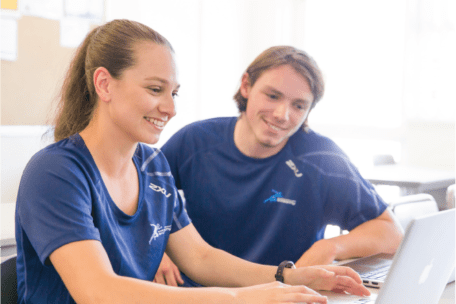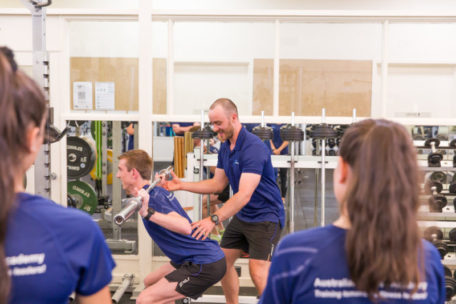If you’re thinking about studying a fitness course, one of the first choices you’ll need to make is whether to complete the qualification online or on campus. Whilst the outcome will usually be the same across both study methods, there are some differences between the two, as we’ll explain in this article.
When making this decision, you’ll want to consider a few things to work out which option is best for you:
- Experience – how do you study best?
- Flexibility – does it meet your lifestyle needs?
- Price – what are you looking to pay?
Before we delve into these three elements, let’s first take a look at what’s usually involved in studying online vs studying face-to-face.
Online Learning
Upon enrolling into an online course, you’ll receive login details to access the material and assessments via a custom-built learning management system. The units will be listed and you’ll progressively work your way through each one, typically via a series of videos, presentations, slideshows, etc. This content can either be presented live or accessed on demand whenever you like. There will also be varying assessment formats, including quizzes, short written responses, video submissions, etc. After submitting an assessment, you’ll receive either an immediate response (for example, with a quiz) or an outcome with feedback days later, depending on whether you’ve successfully passed that assessment or not.

Face-To-Face Learning
This is usually a lot more structured, where you are required to attend an in-person class over a series of weeks or months. These classes are typically a mix of practical and theoretical learning, where you may attend a presentation or lecture, as well as live demonstrations in a practical environment. In regards to assessments, these may include a mix of practical and online, where you’ll need to demonstrate your learning in front of a lecturer (and peers), as well as complete online tasks.

Now with more understanding of what’s typically involved in these two study methods, let’s take a look at the key differences when completing a fitness qualification.
Experience
One of the first questions you should ask yourself is whether you prefer to learn in a more practical environment or whether you’re happy to sit behind a desk and complete a course that way. A fitness course completed on campus will often involve learning about the various elements of the industry on the gym floor, which means you’ll get hands-on opportunities throughout your studies. At AFA, we even have a purpose-built gym which students have exclusive access to. We spend approximately 60% of class time learning practically, with the remaining 40% spent in the classroom either introducing or revising key topics to run through the content in further detail and solidify students’ knowledge.
In comparison, online study will often include the bulk majority of your learning taking place digitally, in which you’ll be able to access the virtual content on-demand in your own time, before completing online assessments such as quizzes, written responses and case studies. For those who prefer to study more visually than practically, our collection of presentations, slideshows, videos and podcasts allows students to engage with our content interactively.
Flexibility
By completing a face-to-face course, you’ll typically be required to attend classes on campus on set days and times, meaning you’ll need to make yourself available to meet the attendance requirements. Our on-campus courses usually run from 9am to 4pm, two days per week – either Mondays & Wednesdays or Tuesdays & Thursdays. This option is well suited for part-time or casual workers, high school graduates, uni students or non-working parents.
Meanwhile, studying online will allow you to complete the course at your own pace, with no set times when you have to attend classes or submit assessments. On-demand content can be accessed at any point of the day, allowing you to schedule your study time around other aspects of your life. We even have a Mobile App available on both Android and iPhone, which allows you to view the content and complete assessments on the go. We also offer students up to 12 months per Certificate (or 8 months for the Fitness Fundamentals), providing the peace of mind should you need to devote time to other areas of your life.

Price
As there are greater costs involved in delivering a fitness qualification on campus, you’ll often find that face-to-face courses are priced a little higher than online. This is because you are getting a more advanced level of access to resources (such as gym equipment), as well that direct support from lecturers.
Online fitness courses will come in a bit cheaper, but it’s important not to have cost as a determining factor solely. Some education providers offer significantly lower prices because they deliver a more inadequate quality of course, such as lack of support, hard-to-use system or hard-to-understand content and some even charge additional costs if you require assistance throughout your studies.
At AFA, we’re confident in saying our courses are affordably priced compared to most in the market, whilst also offering the flexibility of getting started with just a $100 deposit, then setting up an interest-free direct debit plan for all students from $50 per week (online) / $75 per week (face-to-face) or $100 per fortnight (online) / $150 per fortnight (face-to-face).
After considering your preferences and weighing up each of the points listed above, you should now have a clearer idea of which study method would work best for you.
If you’d like some more information about our fitness qualifications and what’s involved in both our online and face-to-face courses, feel free to contact us on 1300 232 348 or submit an enquiry.











